Introduction: Beyond the information in this article on the 1902 Vera Cruz-Frontera-Campeche cable, little has been written about the Safety Insulated Wire & Cable Company of New York and its cable ship CS Ydun. A recently discovered 1904 catalog from the company provides some further details on the company’s operations and its factory in Bayonne, New Jersey.
Safety Cable deserves a little more recognition; as the 1902 article above notes, the Mexican line was the first cable made in America for foreign owners, and also the first cable of any considerable length laid by an American cable manufacturing company. Unlike its British counterparts, the majority of whose cables were insulated with gutta percha from Malaysia, the Safety Company used para rubber from Brazil and Peru.
As well as its submarine cables the company made all kinds of electrical wire, including lead-covered underground cable, rubber insulated aerial telegraph cable, railroad signal wire, flexible wires of all kinds, galvanized and steel wire, and ship wiring for the US Navy. These are all detailed in the catalog, but only the sections relevant to submarine cables are reproduced here.
Other than the Mexican cable, all the submarine cables made by the company in the early 1900s appear to have been for the US Army Signal Corps for its installations in Alaska and the Philippines, all of which were laid by CS Burnside. After 1905 there is no record of any Signal Corps cable until another Alaska cable in 1924, and this was made by Siemens Brothers. I have found no evidence that the Safety company made any submarine cables after 1904.
In 1925 The Safety Insulated Wire & Cable Company acquired the majority of the stock of Phillips Wire Company of Rhode Island, and the name of the combined operation was changed to the Safety Cable Company. [New York Evening Post, Thursday, September 24th, 1925, p.15]. This reference notes that both companies had been in business for over 32 years, placing the origin of Safety around 1893.
In 1927 Safety Cable was merged with other companies to form General Cable, which remains in business today as a Fortune 500 company.
|
 |
 |
The Safety Insulated Wire & Cable Company
Cable Engineers
Home Offices 114-116-118 Liberty Street
New York City U.S.A. |
The product of THE SAFETY INSULATED WIRE & CABLE CO. is the highest type of insulation known, and is made from pure matured Para rubber applied in a SEAMLESS manner to the copper conductor.
As the name implies, the insulations of this Company insures the transmission of electric currents of any voltage with perfect “SAFETY.”
We fully guarantee our products, being in a position to do so, as we control all the raw material entering into them.
The wire used in the
manufacture of our output is drawn from the ingot and billet at our New Haven mills, and our own experts in South America choose the highest grade of rubber in the forests of Brazil and Peru, shipping the same direct to our Bayonne, N.J., insulating plant.
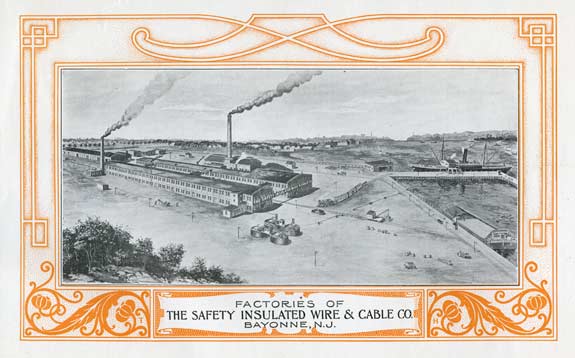
Factories of
The Safety Insulated Wire & Cable Co.
Bayonne, N.J.
|
SAFETY SUBMARINE CABLES.
THE name “SAFETY” is probably better known in connection with Submarine Cables throughout the world than any other of our products.
The manufacture of submarine cables in America has, through the engineering ability of the Safety Company, revolutionized this industry throughout the world; whereas, the SEAMLESS rubber, applied by the Safety method, has produced a cable that is equally impervious to the heated waters of the Torrid Zone, as to the ice-bound oceans of the Arctic.
This is readily illustrated by the 3,000 miles of conductors in daily operation connecting the various islands of the Philippine Archipelago, and
the Seattle-Sitka Cable, recently manufactured by this Company, to connect our Alaskan Territory.
Beside the manufacture of these cables for the United States Government, the Safety Company is now in the world’s market to make and lay cable of any length in any depth of water, and among its foreign contracts might be mentioned the 500 miles of cable recently laid for the Mexican Government, from Vera Cruz to Yucatan.
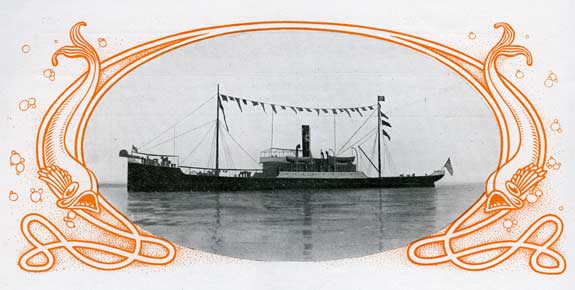
Cable Ship “Ydun” |
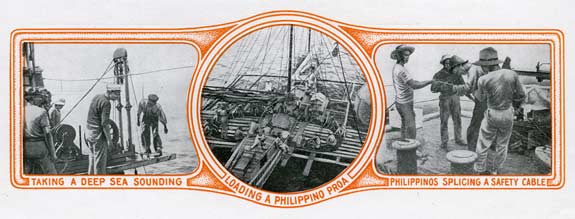
Taking a Deep Sea Sounding / Loading a Philippino Proa / Philippinos Splicing a Safety Cable |
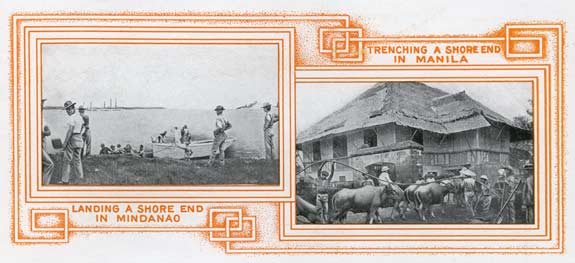
Landing a Shore End in Mindanao / Trenching a Shore End in Manila |
One final illustration from the catalog is an aerial view of the St. Louis World’s Fair of 1904, for which Safety supplied all the cables used for lighting:
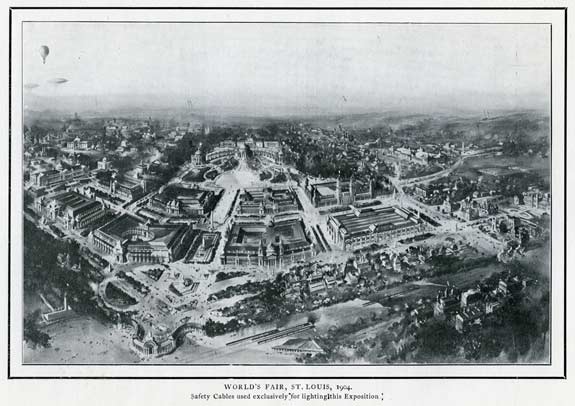
WORLD’S FAIR, ST. LOUIS, 1904
Safety Cables used exclusively for lighting this Exposition |
Also included with the catalog was a promotional pamphlet from the company. The illustrations of CS Ydun and the Bayonne factory in this brochure are as above, so only the text is given here:
Ocean Cables of Any Length Laid in Any Part of the World
Over 5,000 Miles of “Safety” Deep Sea Cables
Are in Daily Use by the U. S. Government
"Safety" Cables used exclusively to light the St. Louis Exposition.
WE MANUFACTURE ALL FORMS OF INSULATED
CONDUCTORS FOR TELEPHONE, TELEGRAPH,
ELECTRIC LIGHT AND POWER PURPOSES.
We Are the Largest Manufacturers of Rubber
Insulations in the World
Write for Quotations
Our Special Railway Signal Wires are used by all the Principal Trunk
Lines in America for Signal Purposes, thus insuring
perfect ‘Safety” to the traveler. |
|

